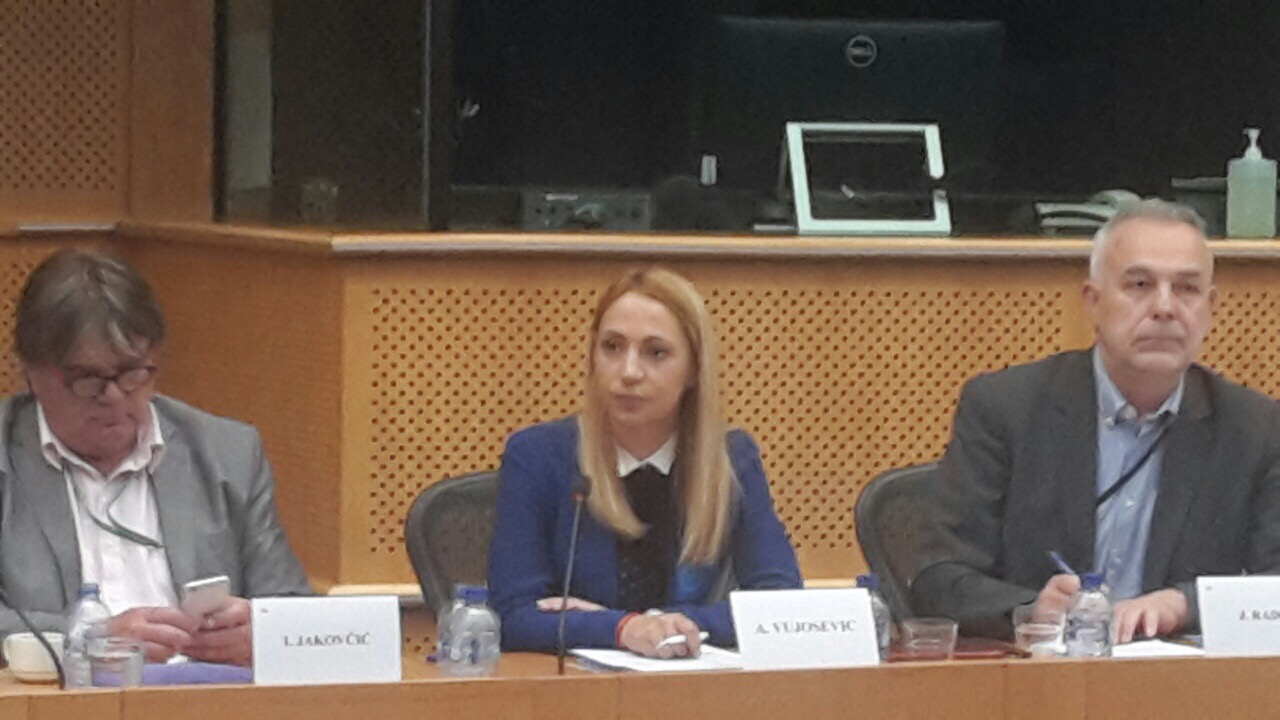Ana Vujošević, Programme coordinator for EU integration at the Centre for Civic Education (CCE), held a presentation in European Parliament, during a hearing organised by ALDE group, titled: “State of plat of press and media freedoms in the Western Balkans”.
Vujošević indicated on the importance of discussion on this subject in European Parliament, as well as the fact that “freedom of media in region is being eroded dramatically, and Montenegro is no exception, regardless of its progress in negotiations with the EU”. She also addressed the issue whether “the EU, and its institutions, can do more through the process of negotiations in order to help improve the freedom of media in region”.
During her presentation, Vujošević stated: “Media scene in Montenegro is widely politicised and polarised. In addition, the practice indicates on numerous flaws in legislative framework, especially in terms of the possibility of influence by the authorities on media market, namely by supporting the media which cover positively the the work of the authorities, and by sanctioning critically-oriented media through the deprivation of financial assets, but also through other repressive measures by state administration which question the sustainability of critically oriented media. As a consequence, the effect of soft censorship is ever-increasing, and some of the first victims of such state of affairs are the journalists’ code of conduct and professional standards, which consequently reduces the quality of journalism in Montenegro”.
She also reminded of previous period of “hard censorship”, characterised with numerous, mostly unresolved, assaults on critically oriented journalists and media property, where the most drastic example is the assassination of editor in chief of daily Dan Duško Jovanović. In addition, she indicated on governments’ obstructions of work of the Commission for the monitoring of investigation of cases of violence against journalists by the government, stating that all that together had “unforeseeable consequences on the overall environment in which the journalists work, causing insecurity and self-censorship”.
“During previous years, we were able to document soft censorship, namely significant financial pressures based on which the authorities tried to influence the editorial policy of media through the use of selective and opaque financing. The CCE’s findings indicate that soft censorship is primarily exercised through political, discretional and opaque allocation of budget funds and state aid to media. Lack of transparency, benchmarks and unbiased procedures, during the allocation of public funds to media, causes serious deviations on media market, which improves the functioning of some media, while simultaneously questioning the existence of other. This directly questions whether these media houses support or criticise the government when reporting on its activities”, stated Vujošević.
She elaborated on key findings from CCE’s research by assessing that: “I believe that this figure ratio illustrates the power of state over the media, and when added the previous experience of unresolved assaults and self-censorship, then the picture is complete and unfortunately gloomy, both in terms of the sustainability of critically-oriented media, and the professionalism of media”.
Vujošević emphasised that “media and NGO sector in Montenegro were, and continue to be crucial actors in the investigation of numerous malfeasance by the authorities”, and that it is important to regulate the public financing of media, presenting also the amendments which CCE prepared in this respect.
“Montenegrin society faces a tremendous challenge in terms of the promotion of truly free media which practice a responsible, fact-substantiated reporting, and reject the official manipulations. It is in the interest of public to have media that can preserve independence and persistence in spite of the obvious political and economic influence and pressure, thus contribute in the establishment of responsible institutions. Improvement of legal solutions, consistent application of laws and regulations which prevent any interference of government in the work of media and their reporting, as well as the work on the improvement of professional standards and compliance with the code of ethics are of key importance for the recovery of media scene in Montenegro”, concluded Vujošević.
Svetlana Pešić, programme associate

